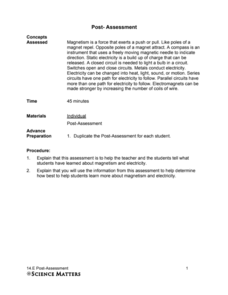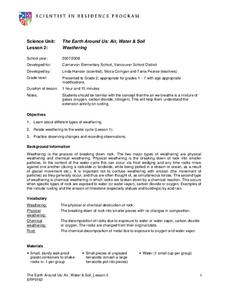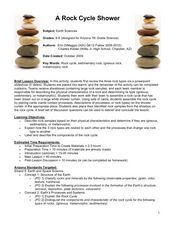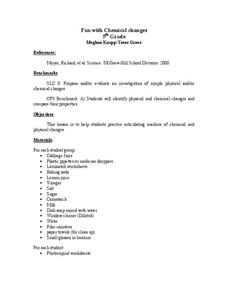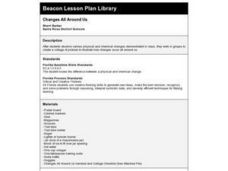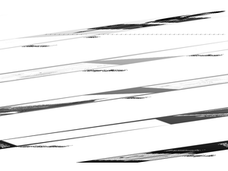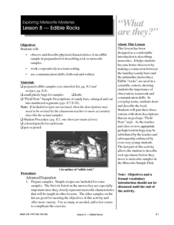Science Matters
Static Electricity
Working with static electricity is sure to give the class a charge! Budding scientists experiment with balloons and different materials to discover how to create static electricity. They learn about the transfer of electrons and the...
Science Matters
Series Circuit and Switches
Lights out! Scholars build on their understanding of a simple circuit by adding a switch and creating schematic drawings. The eighth activity in a series of 14 has pupils use everyday materials to create circuits and make observations as...
Science Matters
Parallel Circuits
The lights don't always go out when the switch is flipped. The 10th lesson plan in a series of 14 helps learners build a conceptual understanding of the flow of electricity through a parallel circuit. They then build their own parallel...
Science Matters
Hot Wire S’mores
The proof is in the marshmallows. Believing that electric energy can transform into heat energy can be abstract, but a hands-on lesson plan gives pupils a concrete example. Young scientists cut marshmallows with copper wires before and...
Science Matters
Motors
It's time to get moving! The 13th lesson in a 14-part unit on electricity and magnetism explores the relationship between electricity and mechanical energy. Budding scientists build motors and experiment with different components to...
Science Matters
Post Assessment: Magnetism and Electricity
Time to know what they know! The final installment of a 14-lesson unit assesses the class's understanding of magnetism and electricity concepts. Items include both multiple-choice and open-ended questions on magnetic fields, electric...
Curated OER
Change It
Fourth graders expand their knowledge about how the physical properties of a substances can be changed. They are given multiple opportunities, using first-hand experiences and familiar objects in different contexts, to identify...
Curated OER
Weathering
Second graders explore weathering and how the water cycle plays a part in weathering. In this weathering lesson, 2nd graders put gravel and sugar cubes in a jar and shake, simulating weathering. Students use the scientific method to do...
Curated OER
A Rock Cycle Shower
Learners classify rocks as sedimentary, igneous or metamorphic based on physical properties. In this earth science lesson, students recreate the rock cycle using a set of stones placed on labeled shower curtain. They explain the...
Curated OER
Rock Candy
Fourth graders observe and demonstrate the physical change of dissolving sugar in water and evaporating the water to examine the physical change that has occurred. They discuss physical changes and solutions, and make rock candy,...
Curated OER
Fun With Chemical Changes
Fifth graders observe and identify the differences between chemical and physical changes. In small groups they mix different substances together in glass beakers, and identify which had a chemical change, supporting their statements...
Curated OER
Chemical Fun
Fifth graders observe and conduct a variety of experiments to differentiate between physical and chemical changes. They mix cabbage juice with different liquids and record their observations on a chart. Students write down their...
Curated OER
The Changing Earth
Students observe and analyze weathering. In this earth science instructional activity, students demonstrate physical and chemical weathering in two experiments, then write questions for a class Jeopardy game.
Curated OER
Changing Sugar
In this chemical and physical change worksheet, students use a sugar cube and observe its physical properties both when it is whole and after it is crushed. They heat the sugar cube and record 5 properties of the matter while being...
Curated OER
Exercise and Water
Second graders discover the needs of their body by trying different types of aerobic exercise. In this physical education lesson plan, 2nd graders analyze The Busy Body Book by glancing at the pictures inside and predicting what the...
Curated OER
Chemical Reactions
In this chemical reaction worksheet, students investigate the results of mixing calcium chloride with sodium bicarbonate. They observe the chemical and physical changes that occur, identify the properties of the chemical before and after...
Curated OER
Evidence of Chemical Change
In this chemical change worksheet, students conduct 4 experiments set up around the room. They follow the instructions at each station for each experiment and list the physical properties and observe any changes at each station. Students...
Curated OER
The American Prairie
Students design an animal. In this prairie activity, students learn about physical and behavioral adaptation, locate the Great Plains on a map, and design an animal that would be perfectly adapted for life on the prairie. Students...
Curated OER
Changes All Around Us
Sixth graders, in groups, observe the difference between physical and chemical changes and create a collage of pictures to show the difference.
Curated OER
Chemical Changes
Fourth graders examine and identify chemical and physical changes in a variety of substances. They observe a vinegar and baking soda demonstration, and a water, laundry detergent, and Epsom salt mixture demonstration. They discuss the...
Curated OER
The Is No Such Thing as a Perfect Pumpkin
Students explore using descriptive words to describe physical appearance. In this appearance lesson, students look at pumpkins and discuss how there is not a perfect pumpkin. Students also hypothesize about what the perfect pumpkin's...
Curated OER
Big Enough?
Students explore the concept of density and buoyancy. In this physics lesson, students discover the different factors that affect an object's density and buoyancy in water. Students conduct several investigations to further understand...
Curated OER
Changes in the Copper Penny
Third graders explore the difference between a physical change in a substance and a chemical change. students study the volume, density, altering shape and chemistry of a copper penny.
Curated OER
Edible Rocks
Students create meteorite models using candy bars. For this earth science lesson, students describe the physical features of a meteorite. They sketch it and write a short description about it.







